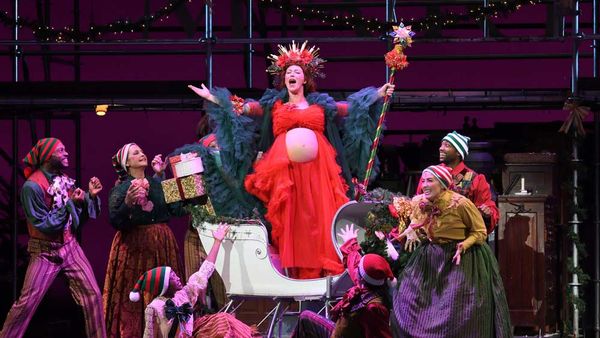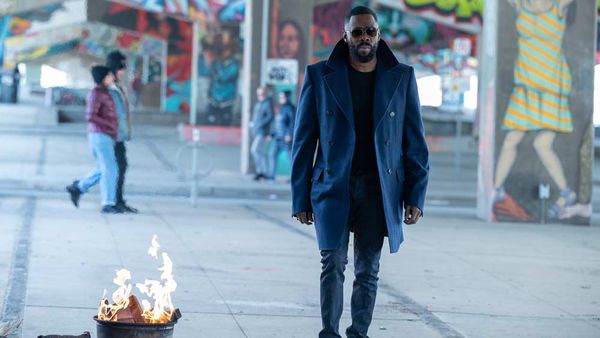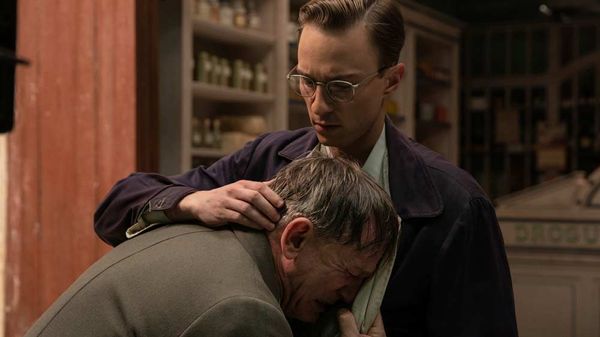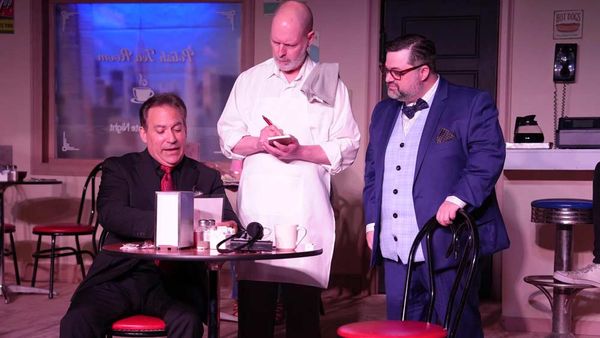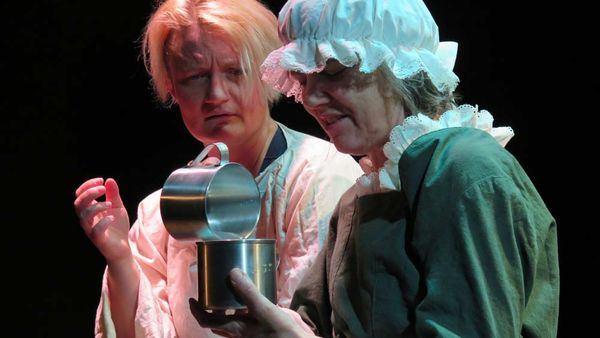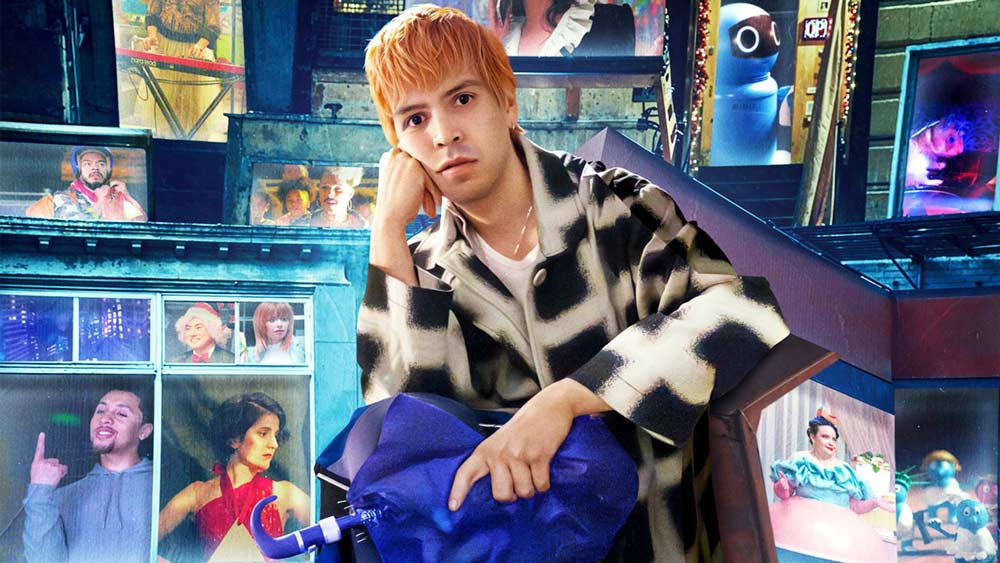
Jun 3
Review: 'Fantasmas' a Hit-or-Miss Deep Dive into Julio Torres' Fantastical Mind
C.J. Prince READ TIME: 5 MIN.
It's been a good year for Julio Torres. The multi-hyphenate comedian recently had his directorial debut "Problemista" come out in theaters via A24, with Tilda Swinton co-starring and Emma Stone producing, a combination of talent that's like winning the lottery for a first-time filmmaker. Now Torres, who got his break writing popular skits for "Saturday Night Live," returns to sketch comedy with "Fantasmas," a six-episode series created, written, and directed by, and starring, Torres, along with a massive amount of celebrity cameos. The series continues Torres' gradual shift from writing for others to taking center stage himself, a move that serves his show for better and worse.
At first glance, "Fantasmas" falls in line with its creator's idiosyncrasies, and with his own take on the sketch format. There's a main storyline where Torres plays Julio, a version of himself who lives in New York City taking on various odd jobs like consulting Crayola on new colors for their crayons. He gets these opportunities thanks to his "agent" Vanesja (Martine), who's a performance artist playing the role of his agent (Julio notes that she's been doing it so long the distinction no longer matters), and he relies on help from his robot assistant Bibo (voiced by Joe Rumrill). With little work to come by and his apartment building about to be torn down, Julio avoids his responsibilities when he acquires and loses a gold oyster earring in the same day.
The show, much like Julio, takes a digressive approach, with many detours involving side characters or indulging in whatever idea Julio conjures up while keeping himself busy. Torres' visual approach leans into artifice and theatricality, shooting the whole series on a soundstage with multiple distancing effects: Rear projection, charmingly crude production design, practical effects like miniatures, and establishing shots that like to showcase the flimsy walls and scaffolding that make up each set. Think Michel Gondry, but less conceptual and with more quirks.
The modular style lends itself well to the sketch format, and Torres' preference for straight-faced, hand-crafted surrealism means there's rarely a dull moment. The dozens of celebrity guest stars will likely get all of the attention (Torres might be the only person in the world who would think of putting Kim Petras, Princess Nokia, and Tilda Swinton in the same scene), but it's Martine's overly-mannered performance as Vanesja that makes the biggest and funniest impression out of the entire cast. With a seemingly endless amount of connections and resources, and an affected voice that sounds like a blend of Isabella Rossellini and Lydia Tár, every moment Vanesja appears usually comes with a delightful and bizarre development that makes her the most compelling aspect of the whole show. And while Torres acts as the force that all of his characters orbit around, he takes on a more benevolent role (Torres has said he likes to think of himself as a master of ceremonies) that allows the supporting cast to shine.
The strength of the ensemble goes a long way in much of "Fantasmas," for as ambitious and distinctive as Torres' style and structure might be, the sketches fall into the hit-and-miss convention that's inherent to the format. One scene portrays the alphabet as musicians, with the letter Q (played by Steve Buscemi) seen as an avant-garde outcast. It's an idea that registers quickly, but the joke gets dragged out for several minutes, with an unsatisfying conclusion. Other sketches reveal more of Torres' hang-ups than anything else. His interest in the degradation of service workers, which featured prominently in "Problemista," reappears here with two customer service phone reps engaging in a BDSM relationship around their work. Another sketch has Kate Berlant as a down-on-her-luck actor playing a superhero at a theme park, who falls for a nerdy, obsessive comic book movie fan (Spike Einbinder). Berlant and Einbinder commit hard to their roles, until the sketch devolves into the low-hanging fruit of portraying Marvel fans as incapable of any original thoughts. These moments disappoint in how their inconsistency doesn't align with the attention to detail put into the show's presentation.
The show has an even hit-to-miss ratio, and the highlights are best left to discover for oneself rather than have them spoiled here (I can guess one particular sketch in the back half of the series, by far the strongest one of the entire season, will likely go viral once it airs). But "Fantasmas" presents itself as no ordinary sketch show, and on this front Torres' presence works against all of his attempts at the unconventional.
From the very beginning, the show makes it known that Julio is special; he was struck by lightning as a child, and his unique way of seeing the world makes him a truly singular individual. It's a setup that establishes Julio as a filter for any hesitant viewers; we're seeing things as Julio sees them, and so he doubles as a tour guide for his skewed point of view. "Fantasmas" is strangely palatable for the most part, and with each episode the artifice and distancing effects incessantly contextualize everything to an oppressive degree.
"Fantasmas" starts out as a sandbox for Torres to play in, but by the end his self-imposed limitations take up most of the space. And while there's plenty to admire and respect about its ambition, one that might be better realized with a second season, the show is a mild letdown when compared to his prior series, "Los Espookys," which he starred in and co-wrote. Set in a Spanish-speaking country whose exact location remained ambiguous, "Los Espookys" featured Torres as part of an ensemble of a ragtag group of horror-loving friends who provided paranormal-related services to various clients. It was a genuinely off-the-wall series that, at least for its first season, was unpredictable and entertaining from one moment to the next. It was also less compromising with its weirdness, expecting people to acclimate to its style but happy to welcome those willing to come along for the ride (not many people did, though, as it got axed by HBO after two seasons).
"Fantasmas" is a different kind of show, one that points inward on its subject, as if we're watching Torres play around in his own head. But there's an element of safety in that method that weighs its eccentricities down, and if "Fantasmas" gets a second season, I hope it will have more confidence to put more trust in its audience and do less hand holding.
"Fantasmas" premieres on HBO June 7.


